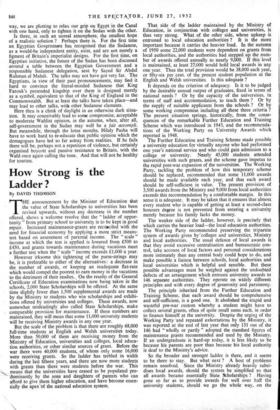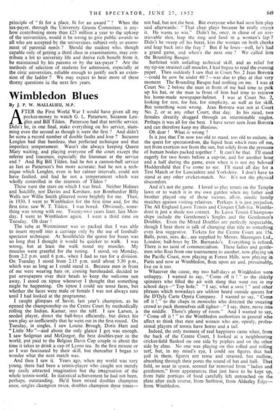How Strong is the Ladder ?
By DAVID THOMSON
THE announcement by the Minister of Education that the value of State Scholarships to universities has been revised upwards, without any decrease in the number offered, shows a welcome resolve that the " ladder of oppor- tunity " from primary school to university is to be kept in good repair. Increased maintenance-grants are reconciled with the need for financial economy by applying a more strict means- test based on assessment of parental income. The " scale " income at which the test is applied is lowered from £500 to £450, and grants towards maintenance during vacations meet a further test when the " scale ", income exceeds £1,000 a year.
However irksome this tightening of the purse-strings may be, it is preferable to either of the alternatives: a decrease in the number of awards, or keeping an inadequate flat-rate which would compel the poorest to earn money in the vacations to the detriment of their studies. On the results of the General Certificate of Education examinations now being taken in the sthools, 2,000 State Scholarships will be offered. At the same time slightly fewer than 1,500 supplemental awards are made by the Ministry to students who win scholarships and exhibi- tions offered by universities and colleges. These awards, now 'somewhat misleadingly also called State Scholarships, make .comparable provision for maintenance. If these numbers are maintained, they will mean that some 11,000 university students will be receiving Ministry awards in any one year.
But the scale of the problem is that there are roughly 68,000 full-time students at English and Welsh universities today. More than 50,000 of them are receiving money from the Ministry of Education, universities and colleges, local educa- tion authorities, or other similar sources of grant. Before the war there were 40,000 students, of whom only some 16,000 were receiving grants. So the ladder has trebled in width during the last fifteen years, and there are now more students with grants than there were students before the war. This • -N,.... means that the, universities have ceased to be populated pre- -dominantly by the sons and daughters of parents who can afford to give them higher education, and have become essen- tially the apex'of the national education system. That side of the ladder maintained by the Ministry of Education, in conjunction with colleges and universities, is thus very strong. What of the other side, whose upkeep is entrusted' to local education authorities ? It is the more important because it carries the heavier load. In the' autumn of 1950 some 22,000 students were dependent on grants from local authorities, and the authorities had stepped.up the num- ber of awards offered annually to nearly 9,000. If this-level is maintained, at least 27,000 would hold local awards in any one year. Thus the total provision would be 38,000 each year, or fifty-six per scent. of the present student population at the English and Welsh universities. Is this adequate ?
It depends on the criterion of adequacy. Is it to be judged by the desirable annual output of graduates, fixed in terms of national needs ? Or by the capacity of the universities, in terms of staff and accommodation, to teach them ? Or by the supply of suitable applicants from the schools ? Or by some working compromise including all- these three criteria ?
The present situation springs, historically, from the conse- quences of the remarkable Further Education and Training Scheme which was introduced in 1943, and the recommenda- tions of the Working Party on University Awards which reported in 1948.
The Further Education and Training Scheme made possible a university education for virtually anyone who had performed one year's national service and who could gain admission to a college or university. Nearly 45,000 students attended nniversities with such grants, and the scheme gave impetus to the rapid post-war expansion of the universities. The Working Party, tackling the problem of how this temporary scheme should be replaced, recommended that some 11,000 awards should be made available each year, and that each award should be self-sufficient in value. The present provision of 3,500 awards from the Ministry and 9,000 from local authorities exceeds this recommendation by a comfortable margin. In this sense it is adequate. It may be taken that it ensures that almost every student who is capable of getting at least a second-class honours degree is not prevented from entering a university merely because his family lacks the money.
The weaker side of the ladder, however, is precisely that which carries the heavier load—the local education authorities.
The Working Party recommended preserving the tripartite system of awards given by'colleges and universities, Ministry and local authorities. The usual defence of local awards is that they avoid excessive centralisation and bureaucratic con- trol, take account of local factors and personal considerations more intimately than any central body could hope to do, and make possible a liaison between schools, local authorities and local universities which is helpful and sensible. But these possible advantages must be weighed against the undoubted defects of an arrangement which entrusts university awards to 146 separate authorities. ' They operate on widely different principles and with every degree of generosity and parsimony. The principle inherited from the Further Education and Training Scheme, that each 'award should be comprehensive and self-sufficient, 'is a good one. It abolished the stupid and wasteful pre-war custom whereby a student might have to collect several grants, often of quite small sums each, in order to finance himself at the university. Despite the urging of the Working Party "and repeated exhortations by the Ministry, it was reported at the end of last year that only 131 out of the 146 had " wholly or partly " adopted the standard figures of maintenance grants recommended and used by the Ministry. If an undergraduate is hard-up today, it is less likely to be because his parents are poor than because his local authority is deaf to the Ministry's advice.
So the broader and stronger ladder is there, and it seems to be there to stay. But what next ? A host of problems remain unsolved. Since the Ministry already heavily subsi- dises local awards, should the system be simplified so that all awards became essentially State Scholarships ? Having gone so far as to provide awards for well over half the university students, should we go the whole way, on the principle of " fit for a place, fit for an award " ? When the tax-payer, through the University Grants Committee, is any- how contributing more than £23 million a year to the upkeep of the universities, would it be wrong to give public awards to all who are accepted by the universities, subject only to assess- ment of parental needs ? Should the student who, though capable only of getting a third class in examinations, may con- tribute a lot to university life and derive rich benefit from it, be maintained by his parents or by the tax-payer ? Are the methods of selection of students for admission, especially at the civic universities, reliable enough to justify such an exten- sion of the ladder ? We may expect to hear more of these thorny questions in the next few years.



































 Previous page
Previous page